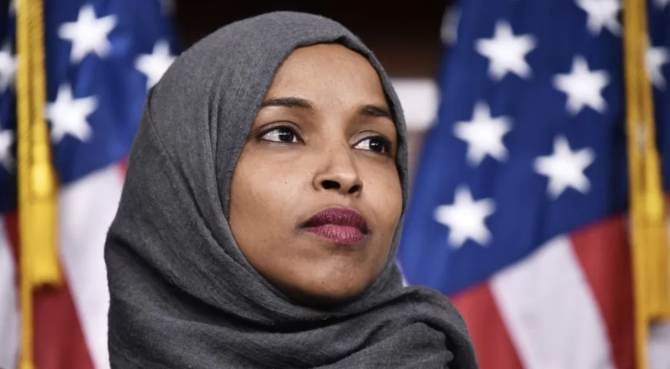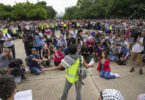Dalia Al-Aqidi
US far-left Rep. Ilhan Omar and two of her colleagues have reintroduced the Combating International Islamophobia Act, which they claim will tackle the global rise in Islamophobia. The bill mandates the creation of a special envoy for monitoring and combating Islamophobia within the State Department, along with a comprehensive strategy to establish US leadership in fighting Islamophobia worldwide. However, the bill’s narrow focus on Islamophobia raises concerns about biased priorities. Singling out one religious group potentially undermines the principles of equality and fairness that lawmakers should uphold.
The bill aims to establish US dominance on this issue, raising questions about the appropriateness and effectiveness of such an approach. Collaboration and cooperation with other nations would be more conducive to fostering understanding and promoting tolerance on an international scale. Omar, with her usual zeal, implored US lawmakers to expedite the passage of this bill, emphasizing that “anti-Muslim bigotry is a global phenomenon.” By framing the issue as interconnected and genuinely global, she attempts to rally support for her cause. Her partnership with Sen. Cory Booker and Rep. Jan Schakowsky is touted as a means to establish a special envoy tasked with eradicating this alleged bigotry. Despite the bill’s previous failure to pass the Senate in 2021, Omar remains determined to build momentum and secure its enactment into law. However, her statements should be critically examined. While it is essential to acknowledge and address instances of discrimination, her portrayal of anti-Muslim bigotry as a sweeping global problem oversimplifies a complex issue. By presenting it as a monolithic phenomenon, she risks disregarding the unique regional and cultural contexts in which such incidents occur.
But why is an American Muslim like myself standing against this bill, along with many other similar-minded Muslims who know firsthand what political Islamism is all about? Upon initial examination, the creation of this special envoy position may appear commendable, as the leader of the free world acknowledges the victims’ plight and stands ready to defend them if necessary. That being said, the reality reveals quite the opposite upon closer scrutiny. The term “Islamophobia” itself raises skepticism, particularly as it emerges as nothing more than a fabrication of political Islamists who seek to silence the dissenting Muslim voices that question their motives and oppose their totalitarian ideology in the name of religious freedom. Astonishingly, the bill passed the US House of Representatives in 2021, despite failing to provide a precise and accurate definition of what constitutes Islamophobia.
The very concept of Islamophobia, as proposed by political Islamists, presents a troubling scenario. It weaponizes the term to stifle any criticism or questioning of their actions, eroding the fundamental principles of freedom of speech and intellectual discourse. This not only silences the Muslim voices that dare to challenge the political Islamist agenda, but it also hinders the ability to have an open and honest dialogue about the complex issues surrounding Islam in the West. Without a solid foundation or widely agreed understanding of the term, its implementation and enforcement become subjective and potentially open to abuse. This lack of clarity undermines the bill’s effectiveness and raises questions about its true intent and purpose. A more robust and thoughtful approach is necessary to address discrimination and protect religious freedoms without compromising the principles of free speech and intellectual debate in the land of the free.
Can categorizing Hamas, Palestinian Islamic Jihad or the Iranian Islamic Revolutionary Guard Corps as terrorist groups be labeled as Islamophobic? Similarly, when condemning suicide bombings or stabbings perpetrated by extremists, does that automatically lead to accusations of bigotry? Perhaps the most crucial issue is whether opposing the Muslim Brotherhood and its advocates inside the US would result in one being labeled an Islamophobe and subjected to cancellation. It is crucial to distinguish between genuine critique that is rooted in the pursuit of truth and justice and actual prejudice or discrimination against Muslims as a religious or ethnic group. Conflating the two stifles necessary conversations and prevents the real issues affecting Muslim and non-Muslim communities from being addressed.
Last week, Omar made it clear that she would not be attending Israeli President Isaac Herzog’s upcoming address to Congress. Taking to Twitter, she stated: “There is no way in hell I am attending the joint session address from a president whose country has banned me and denied Rashida Tlaib the ability to see her grandma.” This statement referred to an incident in 2019, when Israel decided to prevent both Omar and Rep. Rashida Tlaib from visiting the country. The rationale behind this move was based on their involvement in promoting activities associated with the Palestinian-led Boycott, Divestment and Sanctions movement. Omar’s decision to boycott Herzog’s address and her reasoning behind it must be subjected to scrutiny. While her stance may resonate with her supporters, it risks perpetuating a cycle of division and hindering the potential for constructive dialogue. Despite the joint meeting of Congress scheduled for July 19, it appears that Omar is either unaware of or is disregarding the role and significance of Herzog. In Israel, the presidency is a primarily ceremonial role, without significant political authority. He serves as a unifying figure, representing the entire nation. It is important to note that Herzog, a member of the left-wing Labor Party, is not even part of the current coalition government in Israel.
The presence in Congress of Islamist politicians poses a significant challenge for moderate Muslims who have sought refuge in the West, having fled their countries due to political, religious or economic hardships. These politicians’ extremist ideologies and actions undermine the values of tolerance, pluralism and inclusivity that many moderate Muslims cherish and appreciate in their adopted homelands. The voices of moderate Muslims need to be heard and amplified, highlighting their commitment to peace, coexistence and shared values. By actively challenging the narratives put forth by Islamist politicians, broader society can support and protect the rights and well-being of moderate Muslims, ensuring they can thrive in their adopted countries and contribute positively to their communities.







